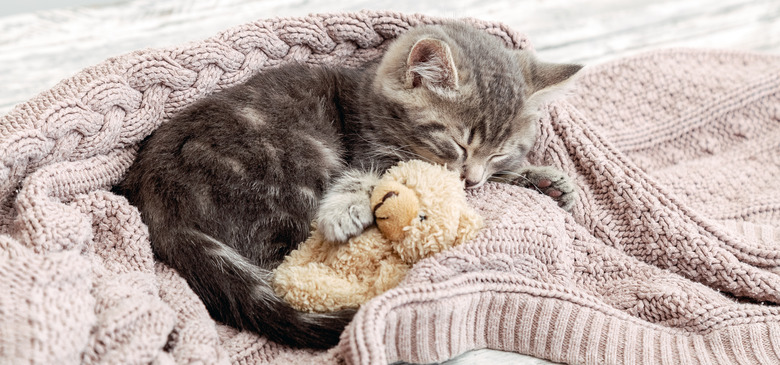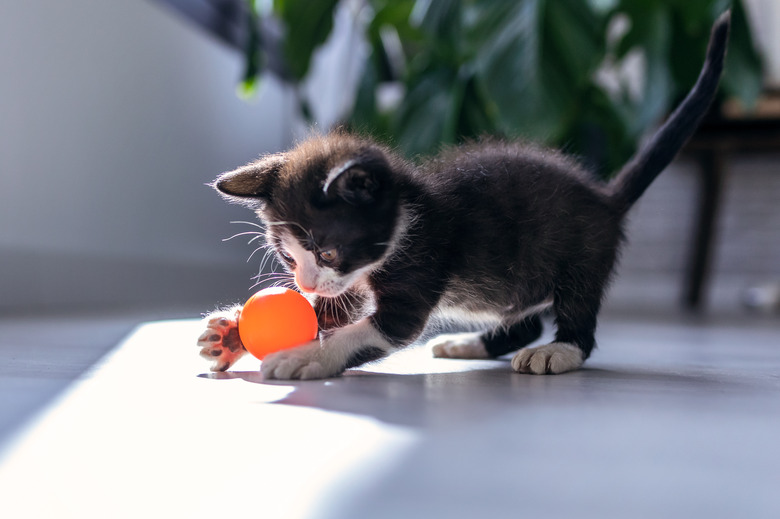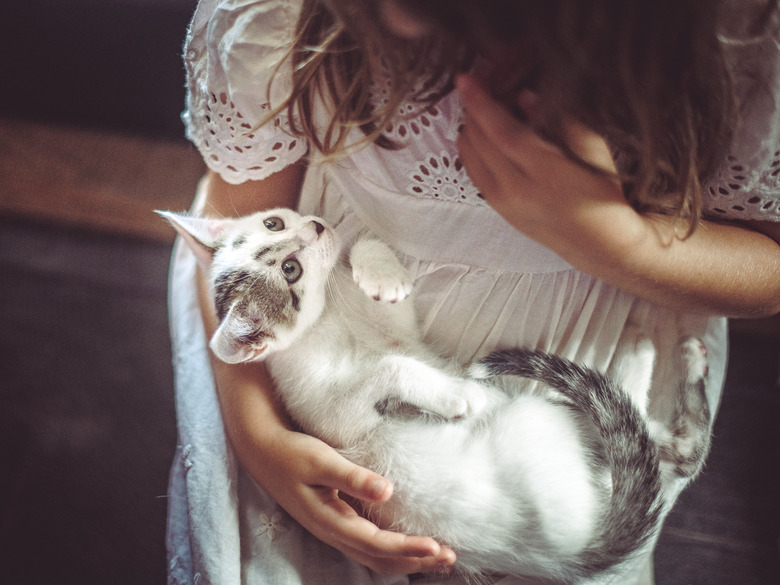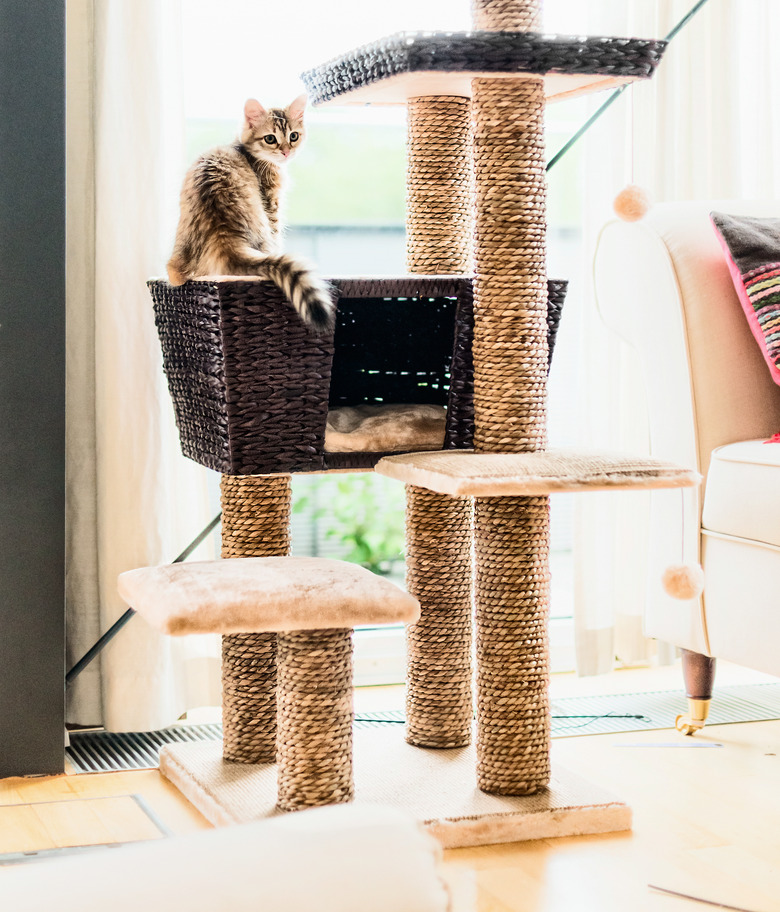How To Survive The First Week Home With A New Kitten
You've fallen in love with a kitten, filled out all the paperwork, and are getting ready to bring them home. Amazing! By planning ahead and knowing what to expect, you can help your new baby adjust during their first week home.
What a kitten needs on their first day in a new home
What a kitten needs on their first day in a new home
Kittens may be nervous in a new environment and will need lots of patience on their first day. Before you bring them home, designate a small, quiet room to place them in. Cat-proof the room by removing any safety hazards, and add a cozy cat bed and enrichment items like toys and a cat tree. If you have other pets, make sure they cannot access the kitten's room. You want to create a safe, secure environment that a kitten can explore without being overwhelmed.
When you arrive home with the kitten, set them and their cat carrier in the room. Open the carrier door and place kitten food, fresh water, and a litter box near the entrance. Sit in the room and give them time to come out of the carrier willingly.
If your kitten is cowering in the back of the carrier and won't come out after about 30 minutes, gently remove the top of the carrier, take the kitten out, and show him the food and water bowls. You can also tempt him with a bit of wet kitten food or treats. Once he's gotten brave enough to start exploring the room, continue to sit with (and supervise) him.
New kitten checklist: what to have ready on the first day
New kitten checklist: what to have ready on the first day
Here are all the essentials you should have ready on the first day with your new kitten:
- Kitten food (ask their shelter or foster family what food they've been eating, and continue to provide that for now)
- Food and water bowls
- Cat carrier
- Toys (try to have a variety: kick toys, wand toys, and so forth)
- At least one cat bed
- Collar and ID tags
- Litter box
- Litter
- Optional: litter box liner, if you prefer to use them
- At least one scratching board or post
- Treats (try to have a variety of these as well: your kitten may prefer crunchy treats, soft treats or liquid treats)
These are just the basics for the first day. As the weeks go on, there will be more things you'll need, such as grooming supplies and flea preventatives. You'll also get a feeling for your kitten's preferences in the way of treats, toys and scratchers, and you'll soon need to purchase plenty more of those!
When family members meet a new kitten for the first time
When family members meet a new kitten for the first time
If you share your home with family, especially kids, they will likely be eager to meet the new kitten! Before bringing your kitten home, have a family talk about what the kitten will need during their first week. If you have young kids, talk to them about the kitten's feelings in a way they can understand. As excited as kids might be to rush in and play with the kitten, explain that she might need some time to feel comfortable before she's ready to meet new friends.
Talk to kids about cat body language and show them pictures of cats who are happy, playful, and scared. Teach them how to safely hold and pet a kitten and always supervise their interactions.
When the kitten seems confident in her room, bring family members in to meet her. Have them sit on the floor and allow the kitten to come say hi on her own time. Use quiet voices and calm body movements. Keep interactions with new people short at first (around 10 minutes) and don't force the kitten to come out of her hiding place or be handled if she seems nervous.
Socialization and positive reinforcement for a new kitten
Socialization, the process of introducing a kitten to new people and environments, is a vital part of ensuring they grow into a happy, friendly, confident cat. Kittens need to be socialized at a particular time in their development, as socializing too early or too late can keep them from developing proper social and coping skills. Experts generally agree that the best time to socialize kittens is between 3 and 9 weeks.
The goal of socialization is to introduce the kitten to a variety of people, sounds, smells, and situations. Start by giving the kitten a tour of her new home and letting her explore different rooms. Designate a kitten-accessible spot for her food bowl, water, and litter box (a cat litter tray can also be helpful for litter training). Use positive reinforcement when introducing your kitten to new things and reward them with a treat and a cuddle.
If you have a resident cat or other pets in the home, introduce them slowly and always under supervision.
What a kitten needs in their first week in a new home
What a kitten needs in their first week in a new home
During its first week home a kitten will need love, comfort, and patience while he adjusts. Creating a safe environment will help them become more confident and curious throughout their first week.
Give lots of enrichment items and encourage playtime when the kitten shows interest. Provide lots of socialization, positive reinforcement, and affection. Remember, some kittens may naturally be braver and more social than others — don't be discouraged if your kitten takes a couple of days to come out of his shell.
The bottom line
The bottom line
Give your new kitten lots of love and reassurance during their first week in their new home. Set everyone up for success by talking to family members about what to expect beforehand. Give your kitten a small, safe room to explore before introducing them to new people, pets, and rooms. Socialize your kitten and provide opportunities for playtime throughout the week, while also giving them time to rest.





